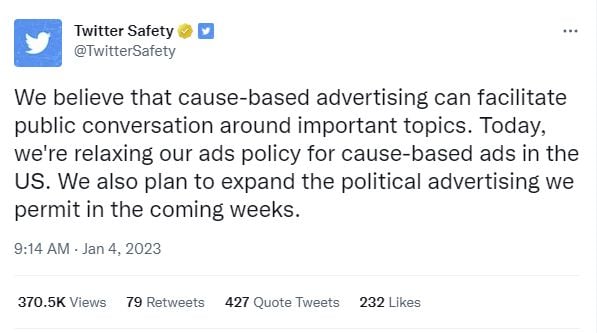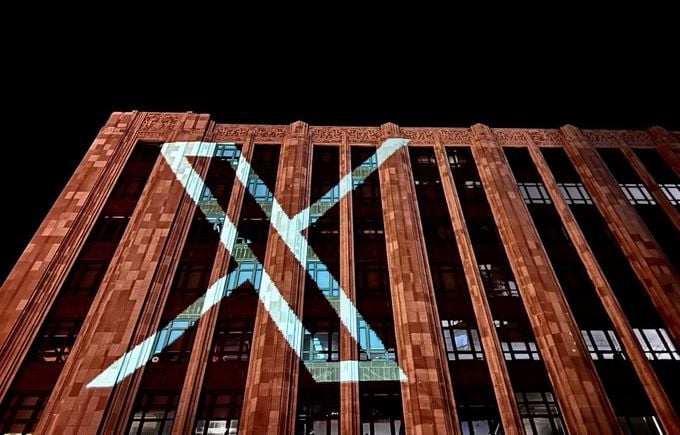X has announced some new updates to its political content policies, in preparation for the next wave of global voting cycles, and the role that X is hoping to play in overall discourse.
Much has been made of X’s shifting policy approaches under Elon Musk, who himself has become a more active political commentator since taking over the app last year. And with the U.S. presidential pre-selection processes now underway for the 2024 election, Musk has made clear whom he supports, which could also have an influence on X’s policy.
Though, in large part, X is increasingly trying to take a more “hands-off” approach to political discussion, under its “Freedom of Speech, Not Reach” approach, which effectively stipulates that all perspectives, true or not, deserve to be heard, so that the people can decide what’s best.
Which, as we know from recent history, can be a risky approach, but X’s new policy updates align with this, and aim to build on its core free speech ethos.
As per X:
“During elections, our Civic Integrity Policy provides an extra layer of protection that is applied for a limited period of time before and during an election. We’re updating this policy to make sure we strike the right balance between tackling the most harmful types of content – those that could intimidate or deceive people into surrendering their right to participate in a civic process – and not censoring political debate.”
So X is looking to take specific aim at counter-participation tactics, as opposed to moderating what’s being said, as such.
“The policy will also be aligned with our updated enforcement philosophy, Freedom of Speech, Not Reach. We will add publicly visible labels to posts identified as potentially violating the Civic Integrity Policy, letting people know when their reach has been restricted.”
X has been looking to add more transparency to restricted posts for some time, with Musk recently noting that new in-stream indicators will be available soon. One of the most cited concerns among politically-engaged users has been ‘shadowbans’, or restrictions on post reach, based on what they post about. X has indeed had shadowban-style elements embedded in its algorithm in the past, but now, it’s trying to enact new measures that will let users know when their reach is impacted, as opposed to letting them share their updates, and seeing worse performance.
X will also soon allow political advertising once again, which Musk also flagged back in January.

Former CEO Jack Dorsey banned political ads completely in the app back in 2019, becoming the first major social platform to do so, with Dorsey noting at the time that:
“While internet advertising is incredibly powerful, and very effective for commercial advertisers, that power brings significant risks to politics, where it can be used to influence votes to affect the lives of millions.”
Dorsey’s view was that political ads were not worth the negative impacts that can come with them, but Musk, again, has been much more engaged politically, and has repeatedly noted that X should be a forum for such discussion.
Which includes paid promotion.
“Starting in the U.S., we’ll continue to apply specific policies to paid-for promoted political posts. This will include prohibiting the promotion of false or misleading content, including false or misleading information intended to undermine public confidence in an election, while seeking to preserve free and open political discourse. We’ll also provide a global advertising transparency center so that everyone can review political posts being promoted on X, in addition to robust screening processes to ensure only eligible groups and campaigns are able to advertise.”
So X will also add a political ads library, which it’ll actually need to do in order to adhere to the incoming EU DSA rules.
These are not significant shifts in policy as such, as all of the same ad rules and qualifiers remain in place that had been present under past X management. But Elon and Co. are clearly taking a different approach to political ads, and it’ll be interesting to see how they deal with clear cases of misinformation around key topics, and what X’s moderators deem as “correct” or not in such statements.
That’s where the real conflict lies between the old and new approach at the app. Elon Musk has repeatedly noted that social platforms should not be the arbiters of truth in political debate, but in removing themselves from such judgment, that also opens the door for political operatives to spread misinformation far and wide via their networks.
A well-timed misinformation campaign, just before voters head to the polls, can be enough to swing the vote. In the 2019 Australian election, for example, the Liberal Party made a big push to promote a so-called “Death Tax” that its opposition would implement if it were to take office. There was no such tax being proposed, and the opposing Labor party denied its existence. But an amplified push, in the final weeks of the campaign, arguably led to a Liberal victory, with searches for “death tax” jumping significantly in the run-up to the poll.
Should that type of lie be allowed by social apps? What about climate change debate, with some candidates still claiming that human-caused climate impact is largely a hoax, or COVID concerns, the January 6th riots, or any other form of debunked conspiracy theory, which will no doubt be peddled by some candidates?
Musk’s view is that these discussions should all be allowed, under the umbrella of free speech, and it’s already erased its COVID misinformation policies as a result.
The real test, however, is coming, and it seems that X is gearing up to let as much as it can go, without having to intervene.



